Category / Media Studies
The Conversation about midwifery campaign
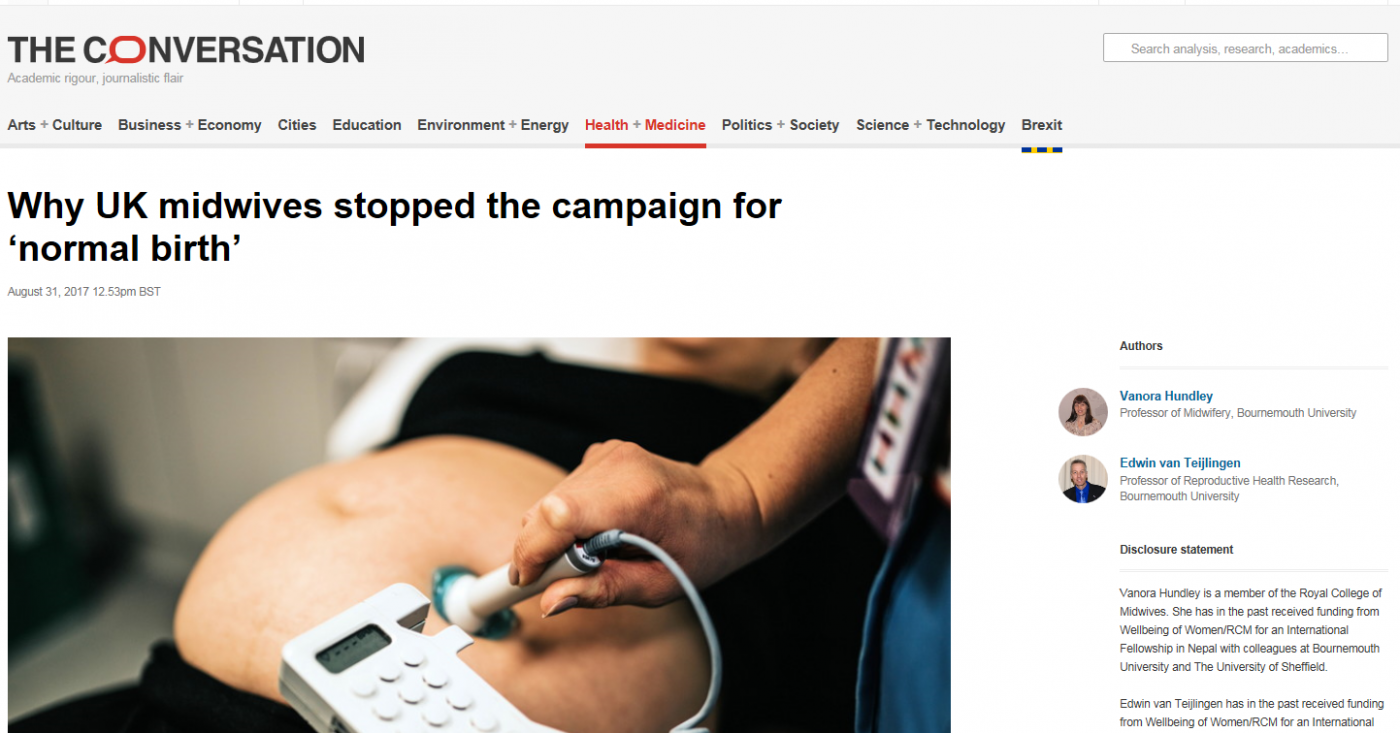
Last week saw the publication of a piece by BU Professors Vanora Hundley and Edwin van Teijlingen in The Conversation under the title: “Why UK midwives stopped the campaign for ‘normal birth’”. The editor of The Conversation invited the authors to write in reply to the statement: “According to media reports, women will no longer be told they should have an intervention-free birth and midwives will be encouraged to use terms a “physiological birth” rather than “normal birth”. We are looking for an expert to comment on this.”
The resulting article is the result of a quite long process of writing a draft, which was initially edited by The Conversation in a way the authors did not feel represented what they wanted to say. In our original submission we raised the role of the media with regard to responsible reporting, but it seems this was a step too far. In submitting a re-written version, which was edited again before it came back to the authors, we were advised that academics should not ‘blame the media’ since that avoids addressing the issue, but what if the media really does have a role? After seven or eight major alterations we reached and an agreed version that we think is a balance and fairly easy to read newspaper article. Our new book Midwifery, Childbirth and the Media due to be published by Palgrave Macmillan will cover these media issue in greater detail.
Professors Vanora Hundley & Edwin van Teijlingen
CMMPH
New research ethics paper Faculty of Health & Social Sciences
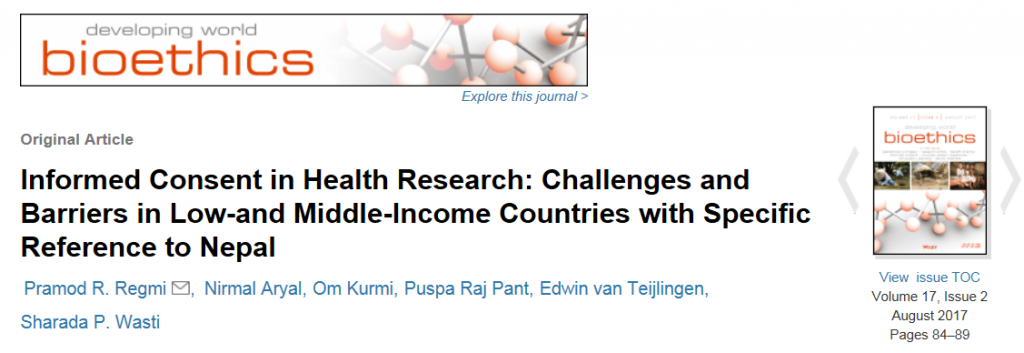 Next months sees the publication of our latest article on research ethics in developing countries [1]. Our paper argues that despite a significant increase in health research activity in low-and middle-income countries (LMICs) in recent years, only limited work has been done to address ethical concerns. Most ethics committees in LMICs lack the authority and/or the capacity to monitor research in the field. This is important since not all research, particularly in LMICs region, complies with ethical principles, sometimes this is inadvertently or due to a lack of awareness of their importance in assuring proper research governance. With several examples from Nepal, this paper reflects on the steps required to obtain informed consents and highlights some of the major challenges and barriers to seeking informed consent from research participants. At the end of this paper, we also offer some recommendations around how can we can promote and implement optimal informed consent taking process.
Next months sees the publication of our latest article on research ethics in developing countries [1]. Our paper argues that despite a significant increase in health research activity in low-and middle-income countries (LMICs) in recent years, only limited work has been done to address ethical concerns. Most ethics committees in LMICs lack the authority and/or the capacity to monitor research in the field. This is important since not all research, particularly in LMICs region, complies with ethical principles, sometimes this is inadvertently or due to a lack of awareness of their importance in assuring proper research governance. With several examples from Nepal, this paper reflects on the steps required to obtain informed consents and highlights some of the major challenges and barriers to seeking informed consent from research participants. At the end of this paper, we also offer some recommendations around how can we can promote and implement optimal informed consent taking process.
 The paper is co-written by six authors, and interestingly five are graduates of the University of Aberdeen. These Aberdeen University graduates are currently affiliated with five different universities. Four of who are based in the UK at: the University of Liverpool, the University of the West of England, the University of Oxford, and in Bournemouth University’s Centre for Midwifery, Maternal & Perinatal Health (CMMPH) and one in the USA: Georgetown University. The sixth co-author, Nirmal Aryal, is currently a PhD student at the University of Otago in Dunedin (New Zealand). Whilst Liverpool-based researcher Dr. Pramod Regmi is heading back for Bournemouth University to become a lecturer in International Health in the Faculty of Health & Social Sciences this autumn.
The paper is co-written by six authors, and interestingly five are graduates of the University of Aberdeen. These Aberdeen University graduates are currently affiliated with five different universities. Four of who are based in the UK at: the University of Liverpool, the University of the West of England, the University of Oxford, and in Bournemouth University’s Centre for Midwifery, Maternal & Perinatal Health (CMMPH) and one in the USA: Georgetown University. The sixth co-author, Nirmal Aryal, is currently a PhD student at the University of Otago in Dunedin (New Zealand). Whilst Liverpool-based researcher Dr. Pramod Regmi is heading back for Bournemouth University to become a lecturer in International Health in the Faculty of Health & Social Sciences this autumn.
Prof. Edwin van Teijlingen
CMMPH
Reference:
- Regmi, P.R., Aryal, N., Kurmi, O., Pant, P.R., van Teijlingen, E., Wasti, P.P. (2017) Informed consent in health research: challenges and barriers in low-and middle-income countries with specific reference to Nepal, Developing World Bioethics 17(2):84-89
Guest talk by Prof. Marina L. Gavrilova from University of Calgary on Biometric Recognition to be held Wednesday 26th of July at 14:30PM in CREATE LT, Fusion Building.
We have the honor to have Prof. Marina L. Gavrilova here on our campus to deliver a talk on Biometric Recognition, recognizing a person by determining the authenticity of a specific characteristic – biometric features, such as Physiological Biometrics (face, fingerprint, hand, ear, Iris, palm print, hand vein, tooth, retina etc.), Behavioural Biometrics (voice, gait, signature, key-stroke dynamics, etc) and Social Biometrics (Twitter, Flickr, etc). The talk will discuss various problems in biometric data acquisition, feature matching, multi-modal fusion, pattern recognition, etc.
Title: The Social Aspects of Biometric Recognition through Human Perception
Speaker: Prof. Marina L. Gavrilova, Department of Computer Science, University of Calgary
Venue: CREATE LT, Fusion Building, Talbot Campus, Bournemouth University, Fern Barrow, Poole, Dorset, BH12 5BB
Time: 14:30-15:30 Wednesday 26th July 2017
Abstract: Our society continues to undergo tremendous growth with respect to all aspects of information access and sharing. It had a profound effect on the way we, humans, and the whole society lives, works and interacts in business and social settings. The information being shared through social networks, on-line communities, games, software development tools, e-mails, blogs, posts, etc. is enormous. It also ranges in type: text, images, hyperlinks, likes, network connections, etc. What’s more, human social, behavioral and even cognitive traits are becoming more and more visible through interlinking of heterogeneous communications in on-line and off-line settings and even in our visual preferences. This phenomenon gave rise to the rise of a new concept: Social Biometrics, that attempts to understand and extrapolate trends related to all aspects of human social activities. The talk is devoted to definitions, examples, case studies and very recent research trends in this domain. The introduced concepts will be further illustrated through two case studies: establishing identity of Twitter users through social networks analysis, and gender recognition of Flickr users based on human aesthetic preferences.
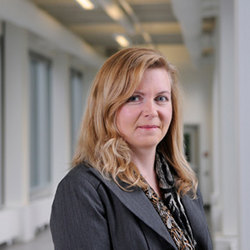
Marina L. Gavrilova is a Full Professor in the Department of Computer Science, University of Calgary. Dr. Gavrilova’s research interests lie in the areas of biometric security, cognitive sciences, pattern recognition, social networks, and cyberworlds. Prof. Gavrilova is the founder and co-director of the Biometric Technologies Laboratory and SPARCS lab, with over 200 publications, including the World Scientific Bestseller (2007): Image Pattern Recognition: Synthesis and Analysis in Biometrics and IGI (2013) book Multimodal Biometrics and Intelligent Image Processing for Security System. She is a Founding Editor-in-Chief of Transactions on Computational Science journal, Springer, and an Associate Editor of the Visual Computer and the International Journal of Biometrics. Prof. Gavrilova has given invited lectures at leading international conferences (3AI, CW, WSCG, GRAPHICON, PSC, ICCI*CC, MIT, ICBAKE, etc), and appeared as guest at DIMACS Rutgers University/Bell Labs, USA; Microsoft Research, Redmond, USA; Samsung Research, South Korea; SERIAS Purdue University, USA, among other universities.
http://pages.cpsc.ucalgary.ca/~marina/HomePHP/index.php
Thanks.
Dr. Xiaosong Yang
http://staffprofiles.bournemouth.ac.uk/display/xyang
BU posters at international midwifery conference
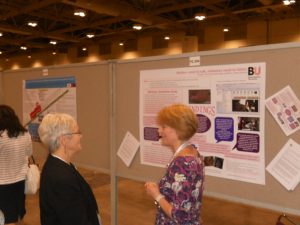 BU academics from the Faculty of Health & Social Sciences had a strong presence at the International Confederation of Midwives (ICM) in Canada this lunch time. They presented four separate academic posters today at the ICM conference in Toronto. First, Dr. Alison Taylor presented her poster ‘Mothers need to talk, midwives need to listen: Insights from breastfeeding mother’s video diaries’. Secondly, Sara Stride and Dr. Sue Way presented their poster on ‘UUPP Study: Updating the Understanding of Perineal Practice at the time of birth across the United Kingdom’.
BU academics from the Faculty of Health & Social Sciences had a strong presence at the International Confederation of Midwives (ICM) in Canada this lunch time. They presented four separate academic posters today at the ICM conference in Toronto. First, Dr. Alison Taylor presented her poster ‘Mothers need to talk, midwives need to listen: Insights from breastfeeding mother’s video diaries’. Secondly, Sara Stride and Dr. Sue Way presented their poster on ‘UUPP Study: Updating the Understanding of Perineal Practice at the time of birth across the United Kingdom’.
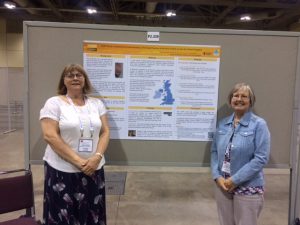 Prof. Vanora Hundley, Dr. Ann Luce (BU Faculty of Media & Communication), Prof. Edwin van Teijlingen and two students, Sofie Edlund and Sian Ridden also presented their poster on ‘Changing the narrative around birth: midwives’ views of working with the media’.
Prof. Vanora Hundley, Dr. Ann Luce (BU Faculty of Media & Communication), Prof. Edwin van Teijlingen and two students, Sofie Edlund and Sian Ridden also presented their poster on ‘Changing the narrative around birth: midwives’ views of working with the media’. 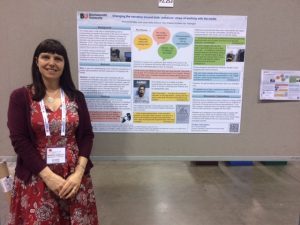
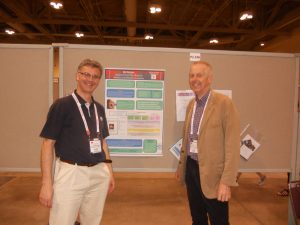 And, last but not least, Prof. Vanora Hundley and Prof. Edwin van Teijlingen also contributed to a poster produced by Dr. Andrew Symon and colleagues from across the UK: ‘Midwifery-led antenatal care models: Mapping a systematic review to an evidence-based quality framework to identify key components and characteristics of care’.
And, last but not least, Prof. Vanora Hundley and Prof. Edwin van Teijlingen also contributed to a poster produced by Dr. Andrew Symon and colleagues from across the UK: ‘Midwifery-led antenatal care models: Mapping a systematic review to an evidence-based quality framework to identify key components and characteristics of care’.
BU contributions to international midwifery conference 2017
Today sees the start of the triennial ICM (International Confederation of Midwives) conference in Toronto. BU is well represented in Canada through academics based in the Centre for Midwifery, Maternal and Perinatal Health (CMMPH) presenting posters, papers and workshops. The ICM programme can be accessed on line, click here!
 Over the next few days BU staff will present on a collaboration with the Anglo-European College of Chiropractic: ‘Newborn feeding clinic service evaluation: Midwives working in partnership with chiropractors to enhance breastfeeding experiences of mothers & babies in the UK’.
Over the next few days BU staff will present on a collaboration with the Anglo-European College of Chiropractic: ‘Newborn feeding clinic service evaluation: Midwives working in partnership with chiropractors to enhance breastfeeding experiences of mothers & babies in the UK’.
Dr. Rachel Arnold presents on her PhD research at Bournemouth University under the title ‘Ensuring high-quality respectful care in a climate of fear and intimidation’. On Wednesday Prof. Edwin van Teijlingen reports on the maternal mental health training conducted in Nepal in 2016-2017 under the title ‘Mental health training for community maternity workers in Nepal’. Dr. Jenny Hall is co-organiser of a symposium Spirituality and Childbirth with Prof. Susan Crowther and Dr. Celine Lemay.
Moreover there will be many BU poster presentations this week including ones by:
- Dr. Rachel Arnold and her PhD supervisors on ‘Women’s rights: the impact of management systems, managers’ practice and attitudes on midwives’;
- Dr. Alison Taylor and her PhD supervisors on ‘Early breastfeeding support for first-time UK mothers: A study based on video diaries’ AND a further posters on ‘Mothers need to talk, midwives need to listen: Insights from breastfeeding mother’s video diaries’;
- Sara Stride and Dr. Sue Way on ‘UUPP Study: Updating the Understanding of Perineal Practice at the time of birth across the United Kingdom’
- Prof. Vanora Hundley, Dr. Ann Luce (BU Faculty of Media & Communication), Prof. Edwin van Teijlingen and two students, Sofie Edlund and Sian Ridden, on ‘Changing the narrative around birth: midwives’ views of working with the media’;
- Profs. Vanora Hundley and Edwin van Teijlingen also contributed to a poster produced by Dr. Andrew Symon and colleagues from across the UK: ‘Midwifery-led antenatal care models: Mapping a systematic review to an evidence-based quality framework to identify key components and characteristics of care’.
Prof. Edwin van Teijlingen
Toronto, Canada
Re-elected to the Board!
Dr John Oliver, from the Advances in Media Management research cluster (FMC/FoM) has been re-elected to the European Media Management Association Board. Following his election at the association’s recent Annual General Assembly in Ghent, Belgium, Dr Oliver will now serve a 3rd term on the board and be responsible for the Doctoral Summer School in 2018.
The European Media Management Association Conference
Graham Goode, from the Advances in Media Management (AiMM) research cluster recently presented his doctoral research at the European Media Management Association conference in Ghent, Belgium. Under a conference theme of “collaboration in the value chain”, Graham presented data from a multi-year content analysis of strategic collaborations of UK broadcast, production and distribution organisations between 2010 and 2016. The findings show that equity participation, a form of collaboration, where one partner provides finance and expertise to gain access to the other partner’s capabilities in content, formats, talent, people and production facilities, accounted for a substantial and growing proportion of collaborations over the last three years, replacing acquisitions, as the here-to (since 2010) main form of collaboration.
AiMM Awarded Doctoral Summer School!
The Advances in Media Management (AiMM) research cluster have been awarded the European Media Management Association’s Doctoral Summer School 2018.
AiMM is a cross faculty research collaboration between the Faculty of Media & Communications and the Faculty of Management and this award follows on from AiMMs success in hosting the association’s annual conference at BU in 2013.The Doctoral Summer School will be held at BU between the 2-4th July 2018 and is targeted at PhD students at all stages of their research, as well as early-stage post-docs.
Congratulations go to the bid team: Dr John Oliver, Dr Chris Chapleo, Dr Joyce Costello, Graham Goode, Melanie Gray and Conor O’Kane.
World Class defined!
“World Class defined and enabled” is the strapline used by the leading global business transformation consultancy, The Hackett Group.
Christopher Davenport, a Director at the The Hackett Group, recently co-hosted a business engagement event on Digital Strategy and Business Transformation with Dr John Oliver from the Advances in Media Management research group. The event was held in London and formed part of a British Academy/Leverhulme Trust funded project into the successful digital transformations of media firms.
The event was attended by senior business executives from the likes of Ofcom, The Financial Times, Astrazeneca and Bell Pottinger who commented that is was an “excellent event” that provided not only different perspectives on digital transformation, but new ideas and tools that will help them to be more effective in managing business transformation within their firms.
Dr Oliver commented that “Chris Davenport and The Hackett Group have been immensely helpful and supportive in developing methodological ideas and ultimately the dissemination of the research findings”. The feedback from the event participants was highly positive and that it provided a useful platform to discuss and share their experiences of managing the complexity of the digital environment.
New report on the state of local news in the UK
Nepal conference at BU
 FHSS has the honour of hosting the 15th BNAC (Britain-Nepal Academic Council) Nepal Study Days on 12-13 April 2017. All presentations will focus on Nepal, its diaspora and/or the Nepali cultural world. This year’s programme includes a range of issues and studies from across different disciplines. In the past decade these study days have been at universities across the UK, including Liverpool John Moores University, the University of Oxford and the University of Edinburgh.
FHSS has the honour of hosting the 15th BNAC (Britain-Nepal Academic Council) Nepal Study Days on 12-13 April 2017. All presentations will focus on Nepal, its diaspora and/or the Nepali cultural world. This year’s programme includes a range of issues and studies from across different disciplines. In the past decade these study days have been at universities across the UK, including Liverpool John Moores University, the University of Oxford and the University of Edinburgh.
This year several presenters of oral presentations or posters are affiliated with BU (staff, PhD students and FHSS Visiting Faculty). These include the following presentations:
- Identifying the gaps in Nepalese migrant workers’ health and well-being: A review of the literature, by Padam Simkhada, Pramod Regmi, Edwin van Teijlingen & Nirmal Aryal
- Assessing the need and type of continuing professional development (CPD) for nurses trained and working in Nepal, by Bibha Simkhada, Edwin van Teijlingen, Padam Simkhada, Sean Mackey, Rose Khatri, Chandra Kala Sharma & Sujan Marahatta
As well as the following posters
- Reflections on THET-funded maternal mental health training in Nawalparasi, by Jillian Ireland, Andrea Lawrie, David Havelock, Padam Simkhada, Edwin van Teijlingen, Bibha Simkhada, Bhimsen Devkota, Lokendra Sherchan, Ram Chandra Silwal & Shyam K. Maharjan.
- Factors affecting health facility delivery in rural Nawalparasi district of Nepal, by Preeti K Mahato, Edwin van Teijlingen, Padam Simkhada, Zoe Sheppard & Ram Chandra Silwal
- Food belief practices amongst rural and urban mothers in Nepal: A qualitative overview, by Jib Acharya, Edwin van Teijlingen, Jane Murphy & Martin Hind
New book review published by Dr. Pramod Regmi on research ethics
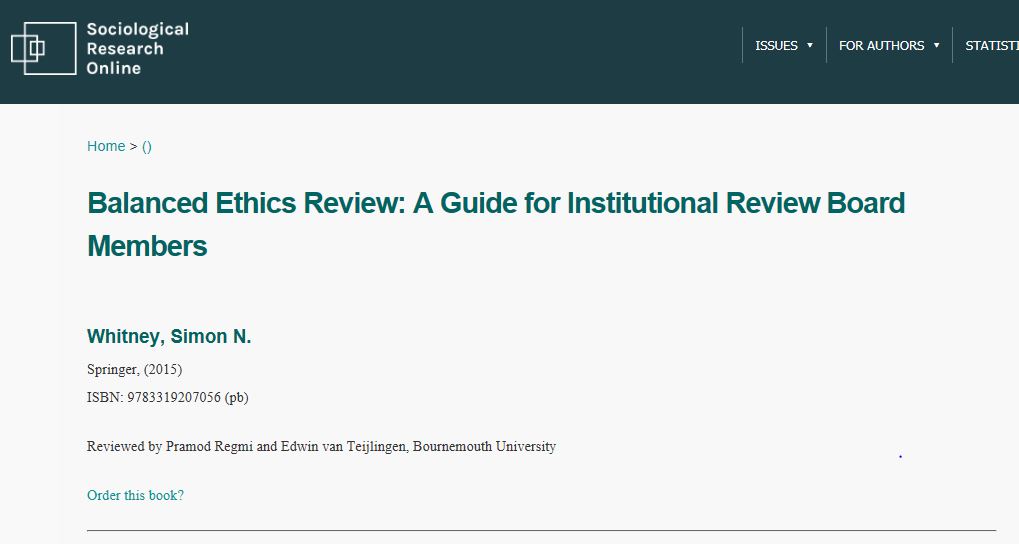 This week saw the publication of the latest issue of the internet-based journal Sociological Research Online. In this issue Dr. Pramod Regmi and Prof. Edwin van Teijlingen published a book review of Balanced Ethics Review: A Guide for Institutional Review Board Members written by the American academic Simon Whitney. [1] In doing so they continue the tradition of FHSS scholars contributing to the research ethics debate. For example, Regmi and colleagues recently had a paper accepted on their insights into research in low-income countries in the journal Developing World Bioethics.[2] Whilst a 2012 FHSS-led paper stressed that researchers conducting research in low-income countries need to apply for research ethics approval to the relevant local authority, if national legislation requires one to do so.[3]
This week saw the publication of the latest issue of the internet-based journal Sociological Research Online. In this issue Dr. Pramod Regmi and Prof. Edwin van Teijlingen published a book review of Balanced Ethics Review: A Guide for Institutional Review Board Members written by the American academic Simon Whitney. [1] In doing so they continue the tradition of FHSS scholars contributing to the research ethics debate. For example, Regmi and colleagues recently had a paper accepted on their insights into research in low-income countries in the journal Developing World Bioethics.[2] Whilst a 2012 FHSS-led paper stressed that researchers conducting research in low-income countries need to apply for research ethics approval to the relevant local authority, if national legislation requires one to do so.[3]
Looking better a little further back, Professor Emerita Immy Holloway wrote about the researcher who may have (potentially) conflicting roles namely those of researcher and health care professional.[4] Whilst a combination of midwifery researchers in the Centre for Midwifery, Maternal & Perinatal Health (CMMPH) highlighted the problems faced by practitioners doing research in their field of practice with perhaps the risk of blurring professional and research ethics, as balancing competing ethical concerns between protecting research participants and over-managing the ethical process can be problematic.[5-6] The latter issue of management and regulation of research ethics has recognised as getting more and more cumbersome and bureaucratic.[7-8]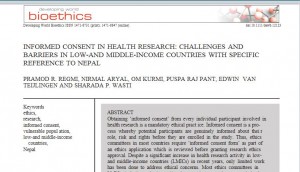
Two further publications by Prof. Ashencaen Crabtree have added to the pool of FHSS publication on research ethics.[9-10] The first one, a book, addressed the problematic issue of gate-keepers in research together with the ethics of critical observation of abuse (potential or actual), as well as the ethics of advocating on behalf of research participants.[9] The second paper covered issues around working with research participants who are regarded as ‘vulnerable’ in a study into the context of care and patient/service user experiences.[10]
Whilst Prof. Parker has highlighted the benefits and dangers of using email and the Internet for social and health research.[11] An even newer research approach is the use of discussion boards as sources of data, which brings its own ethical dilemmas.[12]
In 2010-11 Prof. Parker and colleagues explored in two separate papers the contested meanings and difficulties associated with informed consent, highlighting challenges raised by an almost unquestioned acceptance of biomedical research ethics in social research and questioning whether potential ‘harm’ is different in this context.[13-14]
Prof. Hundley and colleagues discussed the ethical challenges involved in conducting a cluster randomised controlled trial, where getting informed consent can be complication.[15] Whilst it is worth reminding researchers that in issues of informed consent during pregnancy and childbirth one has to consider the potential for harm to two participants.[16]
References
- Regmi, P., van Teijlingen, E. (2017) ‘Balanced Ethics Review: A Guide for Institutional Review Board Members’ by Whitney, Simon N., Springer, (2015) ISBN: 9783319207056 (pb) (book review), Sociological Research Online 22(1) http://www.socresonline.org.uk/22/1/reviews/3.html
- Regmi, PR., Aryal, N., Kurmi, O., Pant, PR., van Teijlingen, E., Wasti, P.P. (forthcoming Informed consent in health research: challenges and barriers in low-and middle-income countries with specific reference to Nepal, Developing World Bioethics.
- van Teijlingen E.R., Simkhada, P.P. (2012) Ethical approval in developing countries is not optional, Journal of Medical Ethics 38:428-430.
- Holloway, I., Wheeler, S. (1995) Ethical Issues in Qualitative Nursing Research, Nursing Ethics 2: 223-232. http://nej.sagepub.com/content/2/3/223.full.pdf+html
- Ryan, K., Brown, B., Wilkins, C., Taylor, A., Arnold, R., Angell, C., van Teijlingen, E. (2011) Which hat am I wearing today? Practicing midwives doing research, Evidence-Based Midwifery 9(1): 4-8.
- van Teijlingen, E.R., Cheyne, H.L. (2004) Ethics in midwifery research, RCM Midwives Journal 7 (5): 208-10.
- van Teijlingen, E. (2006) Reply to Robert Dingwall’s Plenary ‘Confronting the Anti-Democrats: The unethical Nature of Ethical Regulation in Social Science, MSo (Medical Sociology online) 1: 59-60 www.medicalsociologyonline.org/archives/issue1/pdf/reply_rob.pdf
- van Teijlingen, E., Douglas, F., Torrance, N. (2008) Clinical governance and research ethics as barriers to UK low-risk population-based health research? BMC Public Health 8(396) www.biomedcentral.com/content/pdf/1471-2458-8-396.pdf
- Ashencaen Crabtree, S. (2012) Rainforest Asylum: The enduring legacy of colonial psychiatric care in Malaysia, London: Whiting & Birch.
- Ashencaen Crabtree, S. (2013) Research ethics approval processes and the moral enterprise of ethnography. Ethics & Social Welfare. Advance Access: DOI:10.1080/17496535.2012.703683
- Bond, C.S, Ahmed, O.H., Hind, M., Thomas, B., Hewitt-Taylor, J. (2013) The Conceptual and Practical Ethical Dilemmas of Using Health Discussion Board Posts as Research Data, Journal of Medical Internet Research 15(6):e112) Web address: http://www.jmir.org/2013/6/e112/
- Parker, J. (2008) Email, ethics and data collection in social work research: some reflections from a research project, Evidence & Policy: A Journal of Research, Debate & Practice, 4(1): 75-83.
- Hundley, V., Cheyne, H.C., Bland, J.M., Styles, M., Barnett, C.A. (2010) So you want to conduct a cluster randomised controlled trial? Lessons from a national cluster trial of early labour, Journal of Evaluation in Clinical Practice 16: 632-638
- Helmreich, R.J., Hundley, V., Norman, A., Ighedosa, J., Chow, E. (2007) Research in pregnant women: the challenges of informed consent, Nursing for Women’s Health 11(6): 576-585.
- Parker, J., Penhale, B., Stanley, D., (2010). Problem or safeguard? Research ethics review in social care research and the Mental Capacity Act 2005. Social Care & Neurodisability, 1(2): 22-32.
- Parker, J., Penhale, B., Stanley, D. (2011) Research ethics review: social care and social science research and the Mental Capacity Act 2005, Ethics & Social Welfare, 5(4): 380-400.
PCCC success with industry-student collaborative research
A project led by Dr. Georgiana Grigore, a member of FMC/CMC’s Promotional Cultures & Communication Centre, has received a prestigious industry award. The Millennial Rules project won an award for Excellence in Research Presentation at the Media Research Awards, hosted by Mediatel on the 23rd of February. This is an example of innovative fused activity where students work with experts from media organizations and their tutors to develop and co-create excellent research.
Neil Sharman, a freelance researcher, delivered a guest talk for Consumer Culture and Behaviour that led to a collaborative project with the Marketing Society, Metro, Mail Online and CrowdDNA. As part of this collaborative work, three students from the Marketing Society – Jack Goss, Iona Kelly and Emily Richardson – won £1,000 between them after impressing judges with their marketing insights. The students were selected with 10 others to take part in a special workshop day all about Millennials and the Media. The workshop was part of a research project for the Mail Online and Metro newspaper, which aimed to discover more about how Millennials use media. James Harrison, president of the BU Marketing Society at the time, added: “This was a really great opportunity for our members to take part in and the Marketing Society is pleased to have helped make it happen. We continually strive to organise events and opportunities that inspire our members and develop their knowledge in the world of marketing and advertising.”
Neil, who came up with the idea of the project was impressed with the student’s enthusiasm. He said: “We had some start students in the room and we learnt lots from the insights they produced. They represented BU and their generation brilliantly.” Throughout the day the students worked on a range of tasks to define their marketing and advertising insights with help from experts at the Mail Online, the Metro and CrowdDNA. Neil wishes to pass his thanks onto the Marketing Society for contributing to the success of this project.
More details about it can be found here: http://www.millennialrules.co.uk
British Academy Visit – reserve your place now!
 The British Academy is returning to BU on 8 March 2017. This is an invaluable opportunity to find out more about the international and domestic funding available through the organisation. For those of you who are not familiar with the British Academy, it is the UK’s leading independent body for the humanities and social sciences, promoting funding, knowledge exchange and providing independent advice within the humanities.
The British Academy is returning to BU on 8 March 2017. This is an invaluable opportunity to find out more about the international and domestic funding available through the organisation. For those of you who are not familiar with the British Academy, it is the UK’s leading independent body for the humanities and social sciences, promoting funding, knowledge exchange and providing independent advice within the humanities.
The session will last just over 1 hour (13:00-14:15) and will comprise a presentation focusing on international and domestic funding opportunities along with an overview of the British Academy, followed by a Q&A session.
Representatives of the British Academy will be available to answer any individual queries not covered in the presentation or Q&A session, and members of the Research and Knowledge Exchange Office will be on hand should you wish to discuss BU’s processes for bidding to the organisation.
Places for this event can be reserved through Organisational Development here.
New issue on Thought Leadership for PR published in FMC-CMC’s Journal of Promotional Communications
FMC-CMC colleagues, Natasha Tobin and Janice Denegri-Knott, and BA Public Relations student, Anna Lapacz , are pleased to announce the latest issue of the Journal of Promotional Communications: Vol 5, No 1 (2017): Special Edition on Thought Leadership for PR:
http://www.promotionalcommunications.org/index.php/pc/index
The articles in this issue have been prepared by recent graduates of Bournemouth University’s BA (Hons) Public Relations degree who are now working in public relations and marketing. They were conceived as Thought Leadership articles for PR professionals during the L6 Professional PR Unit led by me, Heather Yaxley and Joyce Costello.
The 12 articles cover a lot of ground: from Virtual Reality in PR, to brand building and using Snapchat to reach younger voters during elections. Several of the articles also investigate aspects of practice, such as clients’ expectations of corporate social responsibility to the emerging PR industry in Bulgaria, which given the country’s political and social legacy, has taken a different track from the Western model.
The editorial team hope that you’ll enjoy the latest edition of the Journal of Promotional Communications.
Wanted! External Bid Writers

As part of the Research and Knowledge Exchange Development Framework, Bournemouth University is expanding its pool of external bid writing expertise, through a tendering process.
If you have worked with a good bid writer or, as an external subscriber to this blog, you have written successful research funding applications, please contactus in the Research & Knowledge Exchange Office
We are particularly interested in those who can provide short courses, one-to-one support, bid writing retreats, application review or a range of these and related activities.
Examples of key funders include:
- British Academy
- European Commission funds including Horizon 2020
- Innovate UK
- Leverhulme Trust
- National Institutes of Health and other US Federal funders
- Research Councils
- Royal Society
- Wellcome Trust
- etc.
We look forward to hearing from you.
Research collaboration meeting with Pourakhi in Kathmandu
Yesterday we meet in Kathmandu with colleagues working for Pourakhi. Pourakhi is a charity, a non-governmental organisation (NGO), that helps to advocate for the rights of women who returned to Nepal after migrating for employment. The name Pourakhi, which means self-reliant in Nepali, represents the idea that the organisation is largely run and supported by Nepali women who had migrated abroad for employment.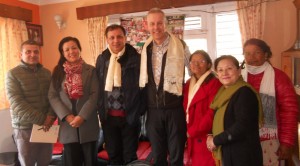
Globalization and trade liberation have opened up opportunities in the international labour market for women in Nepal. Lack of job opportunity in Nepal and poverty have put a growing demand on women to economically support their family. This means many Nepali women are leaving the country to work abroad. In doing so they contribute to the economic prosperity of their families and also in the poverty alleviation of their country through remittances. However, working abroad comes at a cost, as it is not always easy, especially for women.
The Faculty of Health & Social Sciences at Bournemouth University (Prof. Edwin van Teijlingen) and Liverpool John Moores University (Prof. Padam Simkhada, who is also Visiting Faculty at FHSS) have been working with Pourakhi over the past years and half. The main aim of this collaboration is to set up a proper database of women who return to Nepal, based on paper records collected by Pourakhi and use this data to publish academic papers and reports on the issue. The first academic paper based on data collected up to 2014 has already been submitted.
Prof. Edwin van Teijlingen
CMMPH











 Writing policy briefs
Writing policy briefs Upholding Excellence: The Concordat to Support Research Integrity
Upholding Excellence: The Concordat to Support Research Integrity Today’s Documentation Will Serve Tomorrow’s Justice
Today’s Documentation Will Serve Tomorrow’s Justice Up2U: New BU academic publication
Up2U: New BU academic publication New BU midwifery paper
New BU midwifery paper ECR Funding Open Call: Research Culture & Community Grant – Application Deadline Friday 12 December
ECR Funding Open Call: Research Culture & Community Grant – Application Deadline Friday 12 December MSCA Postdoctoral Fellowships 2025 Call
MSCA Postdoctoral Fellowships 2025 Call ERC Advanced Grant 2025 Webinar
ERC Advanced Grant 2025 Webinar Horizon Europe Work Programme 2025 Published
Horizon Europe Work Programme 2025 Published Horizon Europe 2025 Work Programme pre-Published
Horizon Europe 2025 Work Programme pre-Published Update on UKRO services
Update on UKRO services European research project exploring use of ‘virtual twins’ to better manage metabolic associated fatty liver disease
European research project exploring use of ‘virtual twins’ to better manage metabolic associated fatty liver disease